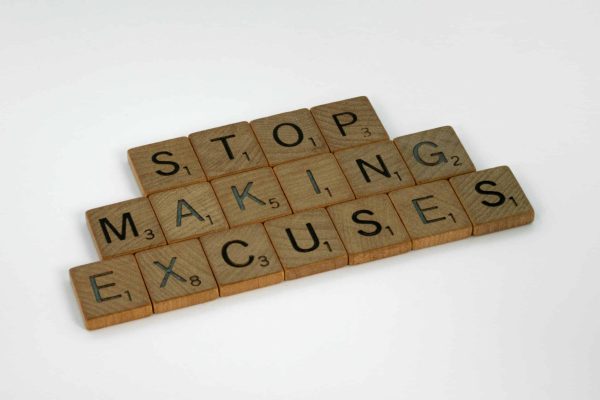When we make excuses we’re saying, “Don’t burden me with responsibility. I’m not to blame. It couldn’t be helped. What else was I to do?”
This is nothing new. After Adam and Eve disobeyed God in the garden, God approached them. He said to Adam in Genesis 3:11, “Have you eaten from the tree of which I commanded you not to eat?” It’s a profound question because commands invoke obligations. Adam has failed to live up to his obligations. So does he own his mistake? “The woman whom You gave to be with me, she gave me from the tree, and I ate” (v. 12). He blames God his wife. He abdicates his leadership in the relationship. “I’m not to blame, God, and I’m not to be held accountable for failing to do what I should have.” What he should have done was told her no, but instead he caved. Now he finds himself trying to justify behavior that violated God’s explicit command.
Excuses are dangerous, contagious, deceitful, and very tempting. Owing to their deceitful nature, excuses offer a false sense of security whereby we think we can slake our lust, and drown our guilt.
Consider this moment in the life of King Saul. I don’t envy that man whenever I read about him. The people clamored for a king, blinded by material concerns. When they first saw Saul they were overawed by his imposing stature, thrilled at the thought of him defeating their enemies in battle. He had a lot of expectations to live up to. Have you ever cracked under pressure?
That’s exactly what he did. In 1 Samuel 13 Saul faced off against the Philistines at Michmash. There were a lot of them and he wanted to sacrifice to God. That must’ve been tough. His soldiers are quaking and discouraged, and began to wilt. So what does he do? “So Saul said, ‘Bring to me the burnt offering and the peace offerings.’ And he offered the burnt offering’” (v. 9).
What’s so bad about that? He wasn’t a priest, he wasn’t a son of Aaron, he wasn’t even a Levite. He was a Benjamite king without the authority to offer a sacrifice, especially not one that Samuel had already determined to offer.
Pay attention to the excuses he gives Samuel: “Because I saw that the people were scattering from me, and that you did not come within the appointed days, and that the Philistines were assembling at Michmash, therefore I said, ‘Now the Philistines will come down against me at Gilgal, and I have not asked the favor of the Lord.’ So I forced myself and offered the burnt offering” (vv. 11-12).
Did you notice anything? First, one excuse begets another. Second, they’re all rational. Third, they’re all true! Isn’t that disturbing? Saul reasoned that because the circumstances were beyond his control that his reaction to them was also beyond his control. We do the same today. Here’s some examples:
- My wife hasn’t been attentive to my needs. We’re in a bind financially, and we’ve fallen behind on the mortgage. And this co-worker is very beautiful. What was I supposed to do?
- That church is not growing. There’s no one there my age, most of them are old. The preaching and teaching is very shallow and all over the place. I get nothing out of it. So, I’m not going.
- Times are tough. I’m on a fixed income; my contribution is so small, it barely reflects on the total. I’m working my way out of debt, which is what God wants me to do, so I’m not giving today.
- I was tempted. I’ve been struggling with this for a long time, it’s almost like an addiction. I know God will forgive me if I confess. It only affects me. Once more won’t hurt.
- They have a hard time putting the past behind them. They’re stubborn and unforgiving. They can also be selfish and vindictive, and they intentionally try to annoy me and they like to gloat in getting their way.
God didn’t respond lightly to Saul’s excuses in vv. 13-14. How will he respond to ours?
In 1 Samuel 15 Saul blames his sin on the people. The people worked in conjunction with Saul to disobey God’s command, but the text doesn’t corroborate Saul’s fear of the people. He said, “I have sinned” in v. 24. Ah! Finally, he swallows his pride and admits his guilt. “I have sinned; I have indeed transgressed the command of the Lord and your words, because I feared the people and listened to their voice.” So much for that attempt. He only redirected the blame.
This is unlike King David, who chose to own his guilt when confronted with it by Nathan. No excuses were made. We make excuses because we think it’s in our best interest to avoid blame, when the opposite is true. It is in our best interest to accept blame and confess guilt (Psalm 32, 51).
Todd McAdams


